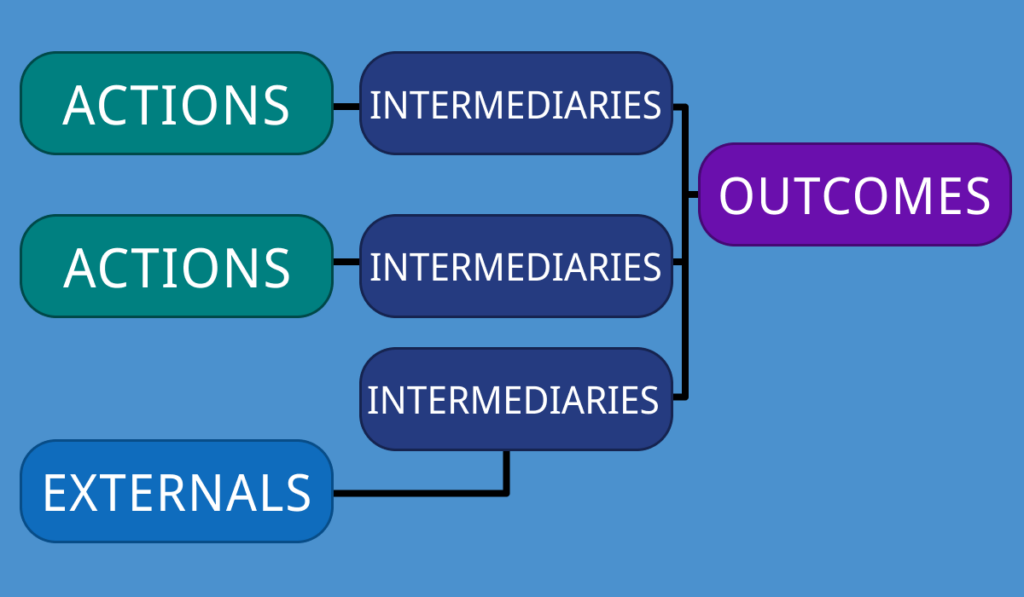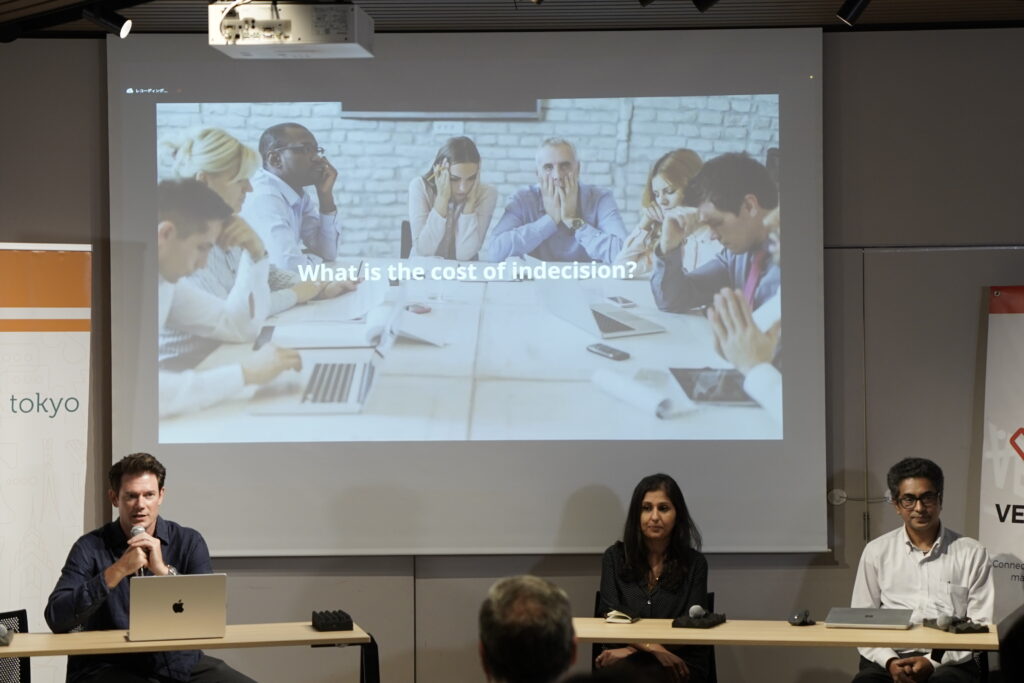Decision Intelligence: The Key to Thriving in Challenging Economic Times?
In today’s dynamic economic landscape, businesses are perpetually navigating challenges that demand swift and effective decision-making. The advent of economic downturns intensifies these challenges, necessitating innovative approaches to maintain top-line growth while optimizing bottom-line efficiencies. Decision Intelligence (DI), a relatively nascent but rapidly evolving field, emerges as a pivotal tool for businesses seeking to thrive amidst economic uncertainties. This article delves into the profound impact of Decision Intelligence on business efficiencies, particularly in times of economic stress, underscoring its role in accelerating decision-making processes and ensuring alignment among stakeholders to drive desired outcomes.
Understanding Decision Intelligence
意思決定インテリジェンス (DI) is a discipline that helps answer the question: “What should we do to achieve our desired outcomes?” As DI has evolved multiple definitions of DI have emerged that differ slightly. Originally, the concept emerged as an engineering discipline intended to combine the precision of AI with human intellect. The term “Decision Intelligence” was first coined by Dr. Lorien Pratt, cofounder of Quantellia, popularized in her first book Link and further expanded on in her second book The Decision Intelligence Handbook. DI has now evolved to become a multifaceted concept that functions as a domain (a specific area of application), a discipline (a field of study with its own methodologies and principles), and a framework (a structured approach to enhance decision-making processes). It’s this comprehensive nature that enables Decision Intelligence to effectively contribute to various organizational and business contexts. The DI recipe includes but is not limited to machine learning, big data, intelligence augmentation, predictive analytics, visual analytics, dashboards, complex systems analysis, causal modeling, agency theory, statistical analysis, and more in a way that answers the most practical of all question which is: “If we take these actions today, how will they impact our desired outcomes?”
A crucial distinction within Decision Intelligence that is often overlooked is the difference between:
1. Decisions to use data to reach a conclusion:
These decisions involve utilizing analytical tools and techniques, such as decision trees or neural networks, to process and interpret data. The goal is to derive insights and draw conclusions based on the available data.
2. Decisions to take action in the real world to achieve a business outcome:
These decisions go beyond mere analysis and involve implementing strategies and actions based on the insights gained. The focus is on achieving tangible business outcomes through real-world applications.
Understanding this distinction is vital, as many discussions around DI tend to conflate these two types of decisions. While the former is essential for deriving insights, the latter is crucial for translating those insights into actionable strategies that drive business results.


The Imperative of Decision Intelligence in Economic Downturns
Economic downturns impose stringent constraints on businesses, compelling them to re-evaluate their strategies and operations. In such times, the agility and accuracy of decision-making processes become critical determinants of success. The traditional decision-making paradigms, characterized by prolonged deliberations and bureaucratic inertia, often result in suboptimal outcomes and inefficiencies. Decision Intelligence, with its robust analytical capabilities and real-time insights, addresses these limitations by streamlining the decision-making process and enhancing organizational responsiveness.
Enhancing Top-Line Growth
During economic challenges, businesses must innovate and adapt to sustain revenue streams. Decision Intelligence enables companies to identify and capitalize on emerging opportunities by providing granular insights into market trends, customer preferences, and competitive dynamics. By harnessing predictive analytics, businesses can anticipate shifts in demand, optimize product offerings, and devise targeted marketing strategies. This proactive approach not only drives top-line growth but also fosters customer loyalty and brand differentiation.
Optimizing Bottom-Line Efficiencies
Cost management is paramount during economic stress. Decision Intelligence facilitates the optimization of operational efficiencies by identifying cost-saving opportunities and streamlining resource allocation. Through advanced analytics, businesses can pinpoint inefficiencies, eliminate redundancies, and enhance supply chain management. Furthermore, DI’s ability to model various scenarios allows companies to evaluate the financial implications of strategic decisions, thereby ensuring prudent and informed cost management.v
Accelerating Time to Decision
The velocity of decision-making is a critical factor in maintaining competitiveness. Traditional decision-making processes, often encumbered by extensive deliberations and stakeholder misalignment, can lead to significant delays and missed opportunities. Decision Intelligence mitigates these challenges by providing a cohesive platform that integrates data from diverse sources, facilitating real-time analysis and consensus-building. This accelerated decision-making process not only reduces time-to-market but also enhances organizational agility and adaptability.
Ensuring Decision Effectiveness
The efficacy of decisions is contingent upon continuous monitoring and evaluation. Decision Intelligence incorporates feedback loops that enable businesses to track the outcomes of decisions, assess their impact, and refine strategies accordingly. By leveraging machine learning algorithms, DI systems can learn from historical data and improve predictive accuracy over time. This iterative process ensures that decisions are aligned with organizational objectives and yield the desired outcomes, thereby enhancing overall business performance.

Founders Evan Burkosky および Dr. Hareesh Nambiar presenting at Venture Cafe Tokyo Thursday Gathering alongside the founder of Social Impact Lab Japan, Priya Sultan.
Implementing Decision Intelligence: A Strategic Imperative
The integration of Decision Intelligence into business operations necessitates a strategic and systematic approach. Organizations must invest in the requisite technological infrastructure, including data analytics platforms, machine learning tools, and collaborative software. Additionally, fostering a culture of data-driven decision-making is essential to ensure stakeholder buy-in and effective implementation. Training and upskilling employees to leverage DI tools and techniques will further enhance the efficacy of the decision-making process.
Conclusion
In conclusion, Decision Intelligence represents a paradigm shift in how businesses navigate complex and uncertain environments. By enhancing top-line growth, optimizing bottom-line efficiencies, accelerating time to decision, and ensuring decision effectiveness, DI provides a robust framework for businesses to thrive during economic downturns. As organizations continue to grapple with the challenges of an evolving economic landscape, the adoption of Decision Intelligence will be instrumental in driving sustainable growth and competitive advantage.
Decision Intelligence is not merely a technological innovation; it is a strategic imperative that empowers businesses to make informed, agile, and effective decisions. As we advance into an era characterized by rapid technological advancements and economic volatility, the importance of Decision Intelligence in shaping the future of business cannot be overstated.
By embracing the transformative potential of Decision Intelligence, businesses can navigate the complexities of economic downturns with confidence and resilience, ensuring sustained growth and operational excellence in an increasingly competitive landscape.
ニュースレターに登録する
kimaru.aiやAI意思決定日本グループの最新情報を受け取るには、ぜひご登録ください。
